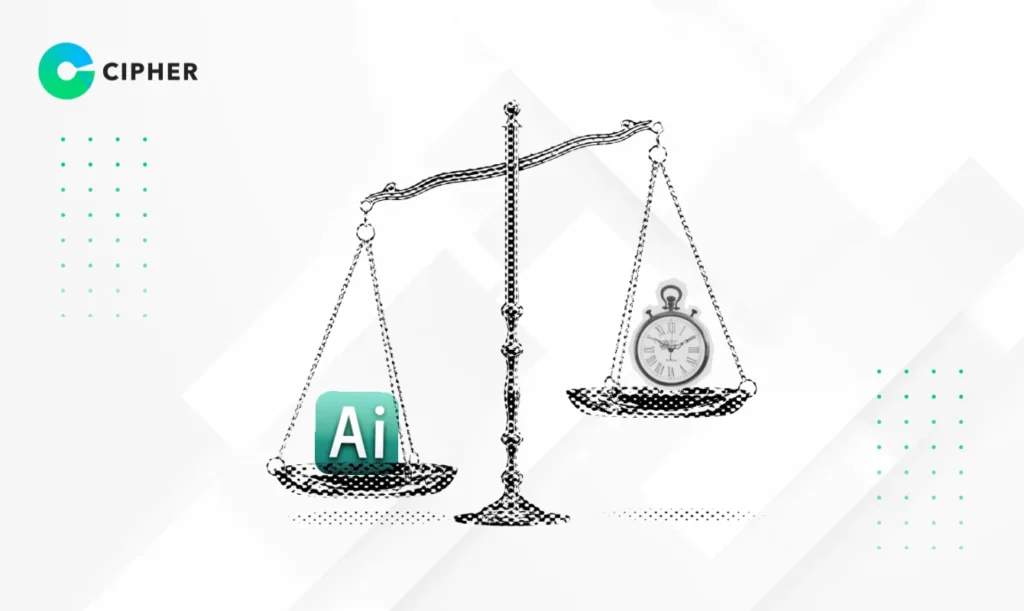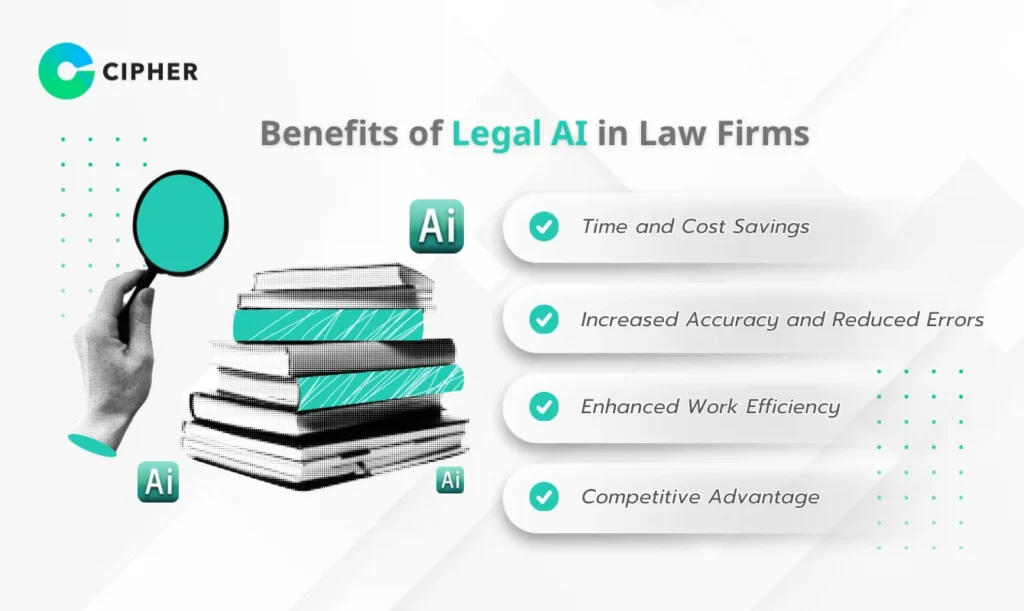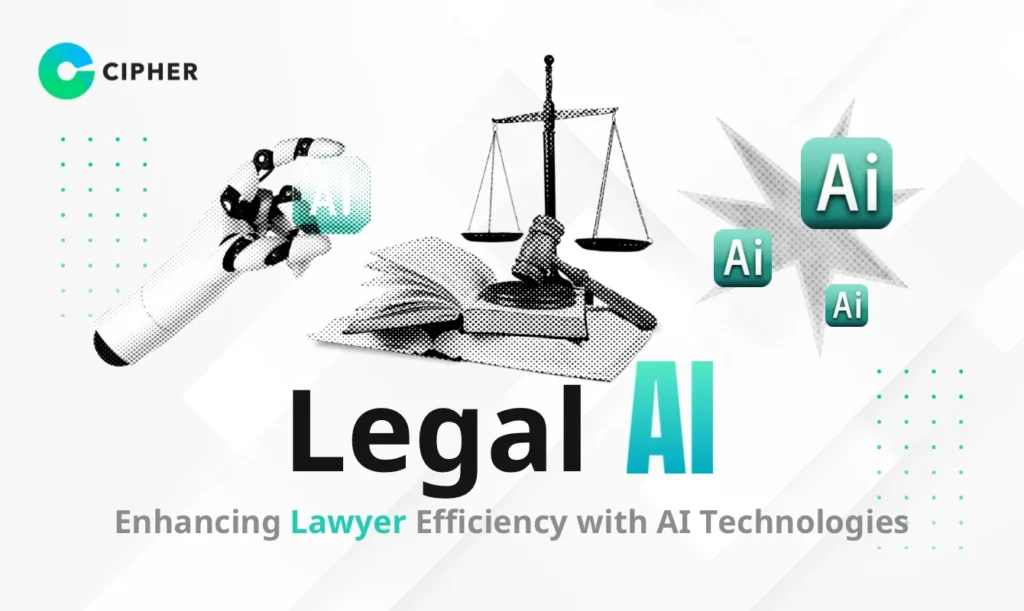Today, the legal industry faces challenges in managing vast amounts of documents, researching relevant case law, and handling time-consuming repetitive tasks. Legal AI is revolutionizing how lawyers and law firms work worldwide, including in Thailand. The use of AI to analyze documents, draft contracts, and verify accuracy helps legal professionals work faster, more accurately, and more efficiently.
How can Thai law firms leverage this technology effectively? CIPHER, experts in software development, will guide you through the clear benefits of using Legal AI for legal work.
Table of Contents
What is Legal Tech and How is it Transforming the Legal Industry?

Legal Tech represents a new approach that brings technology and innovation to the legal industry, helping lawyers work more efficiently, reduce costs, and improve accuracy.
The latest data from 2025 reveals that Legal Tech is growing rapidly, especially after GPT-4 passed the bar exam in 2023, demonstrating AI’s potential to understand and process complex legal information.
Popular types of Legal Tech include:
Automated legal systems: Reducing repetitive tasks and saving time
- Case management systems: Organizing and tracking case progress
- Legal service platforms: Providing legal services online
- Document management: Helping handle large volumes of legal document
Why Law Firms Need to Adapt in the Digital Era
Today’s clients expect faster and more efficient services. Law firms still clinging to traditional methods are at a competitive disadvantage. Implementing AI has become essential, enabling law firms to deliver services more efficiently and cost-effectively. Increased competition in the legal industry gives technology-efficient firms a clear advantage in terms of speed, quality, and value.
Types of AI Used in Legal Work
Several types of AI are used in the legal industry, each assisting legal professionals in different tasks:
- Natural Language Processing (NLP): Helps computers understand human language. In the legal field, NLP enables AI to read, analyze, and interpret legal documents, allowing lawyers to find key information faster than reading everything themselves.
- Machine Learning: Helps AI learn from historical data to predict future outcomes. In the legal industry, this technology helps analyze court decision trends, assess contract risks, and predict case outcomes more accurately.
- Document AI: Designed to process various documents, especially complex legal documents. This system automatically extracts important information, categorizes, and summarizes key content, helping lawyers manage large volumes of documents efficiently.
Intelligent Legal Document Management Systems
Intelligent legal document management systems are essential for modern law firms. These systems not only store documents but also feature intelligent capabilities that enhance work efficiency:
- AI-powered document storage and retrieval: Enables quick and accurate document searching, whether by keywords, dates, document types, or content within documents. AI understands context and meaning, delivering more relevant results than conventional searches.
- Automatic document categorization: AI Contract Analysis automatically categorizes content, making document organization systematic, reducing manual categorization time, and minimizing the risk of misplacement.
- Document sharing and collaboration: Modern systems come with collaboration features, allowing multiple lawyers to work on the same document simultaneously, track changes, comment, and approve documents from anywhere.
These systems reduce document search and management time. Studies show that lawyers spend up to 60% of their working time on document management, making AI a significant time-saver and efficiency enhancer.
Benefits of Legal AI in Law Firms

Time and Cost Savings
Increased Accuracy and Reduced Errors
Enhanced Work Efficiency
Competitive Advantage
Applications of AI in Various Legal Tasks
AI Contract Analysis and Document Drafting
Contracts are central to legal work, and AI can efficiently help with analysis, drafting, and verification:
- Automatic contract review: AI reviews contracts thoroughly and quickly, identifying key provisions, checking legal compliance, and comparing against company standards. Clifford Chance uses Kira Systems to extract and compare contract clauses across multiple documents, helping lawyers quickly identify differences or unusual provisions.
- AI basic contract drafting: Instead of drafting from scratch, AI can automatically create initial contract drafts based on input data. Lawyers use AI to create standard contracts such as employment agreements, leases, or NDAs in minutes rather than hours.
- Identifying contract risks: AI analyzes contracts and identifies potentially risky or unfavorable clauses for clients, such as liability limitations, termination conditions, or unclear provisions, helping lawyers focus on addressing important issues first.
- Case study: A large New York law firm reported that after implementing AI for contract analysis, they reduced business acquisition contract review time and improved accuracy in identifying problematic provisions, allowing the team to handle more work without increasing the number of lawyers.
How to Use AI to Search for Important Case Law
Searching for relevant case law is an important part of case preparation, but traditional searches can be time-consuming and not comprehensive. AI revolutionizes case law searches:
- Techniques for using AI to find relevant case law: AI systems analyze facts of cases lawyers are handling and search for similar judgments, not limited to keywords but understanding context and relevant legal issues, discovering more relevant case law than traditional searches
- Analyzing court decision trends: AI analyzes court decision trends on specific issues, helping lawyers predict case outcomes more accurately and plan appropriate strategies. AI analyzes how each judge tends to rule on specific issues, how different courts view legal issues, and what factors influence decisions.
- Automatic case summary: AI summarizes long and complex judgments into concise, easy-to-understand content, allowing lawyers to understand key issues and reasoning quickly without reading entire judgments.
- Examples of systems used in Thailand: Thailand has developed AI systems for searching Supreme Court judgments, such as the system being developed by the Supreme Court and private platforms that collect judgments and use AI for analysis. These systems help Thai lawyers quickly and comprehensively search for and access relevant judgments.
AI Systems That Save Lawyers Time
Beyond document work and case law research, AI assists in various law firm management tasks:
- Appointment and court schedule management: AI helps manage appointment calendars, alerts about important deadlines, and plans schedules for maximum efficiency. The system links to court calendars and internal appointment systems to ensure lawyers don’t miss important deadlines and can allocate time appropriately.
- Invoice creation and fee tracking: AI helps record working time, create invoices, and automatically track payments, helping law firms maintain good cash flow and reduce financial management time. The system analyzes client payment patterns, forecasts income, and alerts when anomalies occur.
- Managing repetitive document tasks: Repetitive document tasks such as filling forms, creating standard letters, or preparing court documents can be automated with AI, reducing workload and errors. AI learns from past documents and creates new high-quality documents using existing data.
- Client communication through AI: Chatbots and automated response systems help answer basic questions, provide case status information, or schedule meetings 24/7 without waiting for lawyers to be available. These systems make clients feel continuously cared for and help screen questions so lawyers can focus on complex inquiries requiring expertise.
Interesting Legal AI Tools Currently Available
Contract Analysis Tools
These tools help lawyers manage contracts efficiently:
- CoCounsel by Casetext: Uses GPT-4 to analyze contracts, find key provisions, and identify risks, helping lawyers review contracts faster and more accurately.
- Diligen: A platform using AI to process legal documents, expediting contract review and analysis processes, suitable for firms handling numerous contracts.
- DocuSign Insight: A contract and legal document analysis tool helping organizations quickly identify risks and obligations in contracts.
Legal Research and Case Law Search Tools
These help lawyers search and analyze relevant case law and legal provisions:
- Lex Machina: Provides legal insights to companies and law firms, helping analyze cases and court decision trends.
- IBM Watson Discovery: Uses AI to analyze both structured and unstructured data, helping with in-depth information searches and creating intelligent search systems
- ThaiLII: A Thai case law and legal database developing an AI system to help search and analyze judgments
Case Management Tools
These tools help make case management more efficient:
- Clio: Law firm management software with AI features helping manage cases, record time, and create invoices.
- Smokeball: A law firm management system using AI to create documents, track working time, and manage cases.
- PracticePanther: A law firm management platform integrating AI features to enhance work efficiency.
Law Firm Management Tools
These help with overall law firm management:
- Kofax Transformation: Uses AI and Machine Learning to automatically extract data from documents, improving document processing efficiency.
- LexisNexis CounselLink: Helps manage budgets, track expenses, and analyze legal counsel effectiveness.
- LawGeex: An automated system for reviewing and approving contracts, reducing review time and increasing consistency.
Steps to Implement AI in Law Firms
1. Assess Needs and Readiness
Before implementing AI, assess your firm’s needs and readiness by considering:
- Problems and challenges: Identify problems AI can solve, such as time-consuming document searches, delayed contract drafting, or inefficient case management.
- Budget and resources: Determine investable budget for software, hardware, and training.
- Team readiness: Assess how ready your team is to learn and adapt to new technology and whether there are technology-knowledgeable leaders driving change
- IT infrastructure: Check if current IT infrastructure supports AI and what improvements are needed.
2. Choose Appropriate Technology
After assessing needs and readiness, select appropriate technology considering:
- Legal specificity: Choose technology designed specifically for the legal industry, which understands legal language and context better than general AI.
- Integration capability: Check if the technology integrates with existing systems such as document management, accounting, or office management software.
- User-friendliness: Choose technology that’s easy to use, has a friendly interface, and good support for quick team adaptation.
- Value: Consider not just price but long-term return on investment (ROI), evaluating how much time and cost the technology will save.
- Security and legal compliance: Verify the technology has adequate security measures and complies with personal data protection laws and related regulations.
3. Train Personnel
Training personnel is crucial when implementing AI in law firms to ensure everyone uses technology efficiently and maximizes benefits:
- Comprehensive training: Provide training covering both basic usage and advanced features so everyone understands the technology’s full potential.
- Create manuals and reference documents: Develop easy-to-understand manuals and reference documents so the team can find information and solve basic problems themselves.
- Appoint internal experts: Designate team members interested and skilled in technology as internal experts who can help and guide colleagues.
- Create a learning culture: Promote a culture of learning and experimenting with new technologies within the firm so everyone feels comfortable learning and adapting.
4. Measure and Improve Performance
Continuous measurement and improvement are important for maximizing AI benefits:
- Define key performance indicators (KPIs): Set clear metrics such as contract drafting time, number of contracts reviewed per day, or client satisfaction rates.
- Collect data and analyze results: Regularly collect usage and outcome data to analyze whether the technology improves efficiency as expec
- Listen to user feedback: Allow the team to express opinions about technology usage, problems encountered, and improvement suggestions.
- Continuously improve and update: Use collected data and feedback to improve technology usage, update systems, and provide additional training as needed.
Precautions When Using Legal AI
1. Privacy and Data Security
Legal data is often sensitive and requires special protection. Using AI must consider data privacy and security:
- Data encryption: Verify that the technology used has adequate data encryption, both during transmission and storage.
- Access control: Set appropriate data access rights to ensure only authorized personnel can access data.
- Compliance with personal data protection laws: Verify that AI usage complies with personal data protection laws such as Thailand’s Personal Data Protection Act B.E. 2562 (PDPA) and other relevant laws.
- Data backup and emergency plans: Have appropriate data backup systems and emergency plans to prevent data loss in case of technical problems or cyber threats
2. Reliability of AI Results
Although AI has many capabilities, it’s not perfect, and results may not always be accurate. Law firms should be aware of these limitations:
- Human verification: Don’t rely on AI results without expert lawyer verification, especially for important work with high impact.
- Understanding limitations: Understand the limitations of the AI used, such as tasks it performs well and those where it may have errors.
- Updates and training: Verify that AI receives regular updates and training with the latest data for accurate and up-to-date results.
- Understanding AI operations: Understand AI processes to better assess result reliability.
3. Maintaining Professional Standards and Legal Ethics
Using AI should not diminish lawyers’ professionalism and ethics, which remain at the heart of the legal profession:
- Client responsibility: Lawyers still have a duty to clients even when using AI. Final decisions and responsibility always rest with lawyers.
- Client confidentiality: Verify that AI usage doesn’t violate client confidentiality principles, especially when sending data to cloud systems or external service providers
- Avoiding conflicts of interest: Be cautious with AI usage that might lead to conflicts of interest, such as using the same system to serve clients with conflicting interests.
- Continuous professional development: Use AI as a supplementary tool, not a replacement for developing legal knowledge and skills. Lawyers should continue studying and developing themselves.
4. Compliance with Relevant Laws
AI usage must comply with relevant laws and regulations, which may change rapidly in the digital era:
- Personal data protection laws: Comply with personal data protection laws such as Thailand’s PDPA or Europe’s GDPR, which have requirements for collecting, using, and disclosing personal data.
- Copyright and intellectual property laws: Verify that AI usage doesn’t infringe on others’ copyrights or intellectual property, especially when using AI to create content or analyze documents.
- AI-related laws: Monitor developments in AI-related laws that may be enforced in the future, such as the draft Royal Decree on Business Services Using Artificial Intelligence Systems in Thailand.
- Legal professional ethics: Adhere to legal professional ethics even when using AI, considering justice, honesty, and prioritizing client interests.
Legal Tech Services for Thai Law Firms
CIPHER is a leader in software development and cutting-edge technology solutions, specializing in developing AI systems for the legal industry. We understand the challenges Thai law firms face and are ready to offer solutions that truly meet their needs.
Elevate Your Firm with Legal AI Designed Specifically for Thai Lawyers
Comprehensive Law Firm Management Systems
End-to-End Services from Analysis to Implementation
Our services aren’t just about developing and installing systems but also include needs analysis, appropriate system design, team training, and post-installation support to ensure you receive maximum benefits from AI technology.
Whether your firm is small or large, CIPHER is ready to help you become a modern, AI-driven law firm delivering superior services and gaining competitive advantages.
Conclusion
Legal AI is rapidly transforming the legal industry, helping law firms and lawyers work more efficiently, reduce costs, and deliver high-quality services to clients.
CIPHER is ready to be your partner in revolutionizing your law firm’s operations with expertise and experience in developing AI systems that meet the needs of the Thai legal industry, helping you become a modern, efficient digital law firm.
Frequently Asked Questions
How Accurate is Legal AI?
The accuracy of Legal AI depends on several factors, such as the quality of training data, task complexity, and the type of AI used.
However, AI still has limitations in tasks requiring judgment, complex legal interpretation, or case strategy, which still need lawyer expertise. AI usage should always be verified and controlled by lawyers.
Can Small Law Firms Use AI?
What Budget is Required to Implement AI?
The budget for implementing AI in law firms varies greatly depending on several factors:
- System size and complexity: From basic systems costing a few thousand baht per month to comprehensive systems that may cost hundreds of thousands of baht.
- Payment models: Some systems charge monthly or annual fees, while others may require permanent license purchases.
- Number of users: Many systems charge based on the number of users, with more users resulting in higher costs.
- Specialized requirements: Systems customized specifically for your firm may cost more than ready-made systems.
Can AI Replace Lawyers?
AI cannot completely replace lawyers. Despite its ability to process data and perform repetitive tasks efficiently, AI still lacks several important components that make lawyers valuable:
- Judgment and in-depth understanding: Lawyers have the ability to interpret laws, assess situations, and exercise judgment that AI cannot match.
- Negotiation and persuasion skills: Negotiations, jury persuasion, or court presentations require human skills that AI cannot replace.
- Understanding of Social and Cultural Context: Lawyers understand the social, cultural, and human factors that influence the interpretation and application of laws.
- Client relationships and trust: The relationship between lawyers and clients is based on trust and personal consultation that AI cannot create.
How Can I Ensure Client Data Security?
Securing client data is crucial when using AI in law firms. Here are approaches to ensure security:
- Choose reliable service providers: Select reputable AI service providers with strict privacy policies, verify they have adequate security measures, and don’t use data for other purposes
- Understand service terms: Read and understand service terms and privacy policies in detail, especially regarding data usage and storage.
- Use strict encryption and security: Verify the system has adequate data encryption, both during transmission and storage, and has strict authentication and access control systems.
- Limit data shared with AI: Consider limiting data shared with AI systems by removing or hiding unnecessary personal information such as client names, identification numbers, or other sensitive data.
- Comply with personal data protection laws: Verify that AI usage complies with personal data protection laws such as Thailand’s PDPA and obtains client consent for data processing as legally required.
- Choose on-premise or private cloud solutions: Consider choosing on-premise solutions installed on your firm’s servers or private cloud solutions with high security, especially for sensitive data.
CIPHER places high importance on data security and offers solutions with strict security measures, helping you benefit from AI while still appropriately protecting client data.





